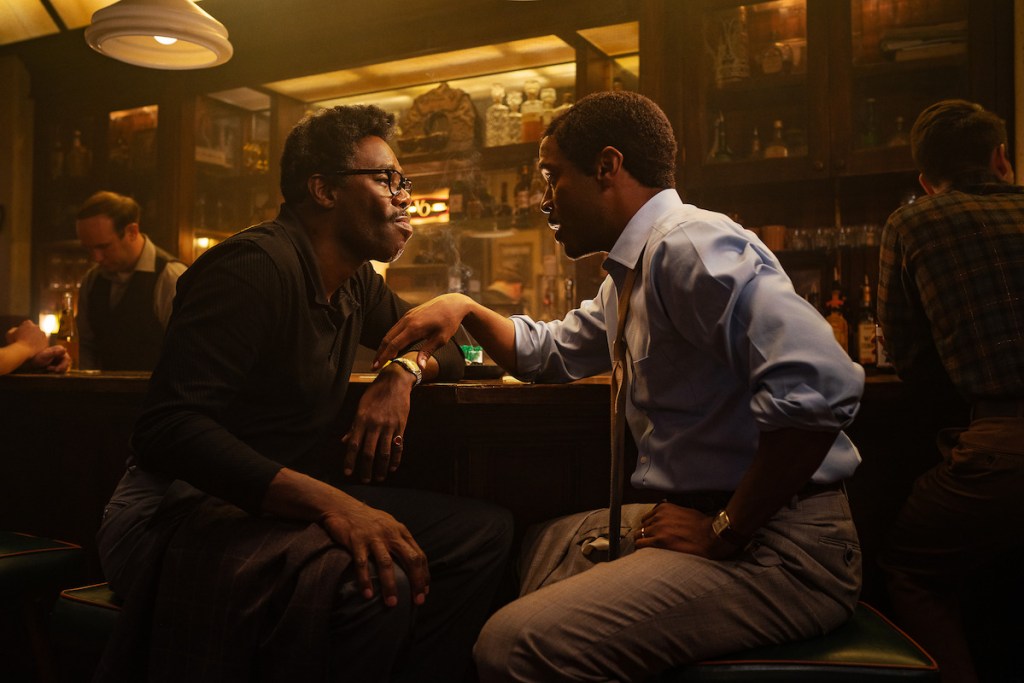In the tapestry of civil rights history, few threads are as vibrant yet underrepresented as that of Bayard Rustin’s. Netflix’s “Rustin” seeks to pull this thread into the limelight, offering a glimpse into the life of a man who masterminded the 1963 March on Washington yet remained largely in the shadows. Let’s dive into the heart of the film, unraveling its portrayal of Rustin’s multifaceted identity as a Black, gay man navigating the turbulent waters of activism.
On the day that I was born black, I was also born a homosexual. They either believe in freedom and justice for all, or they do not.
“Rustin” does more than recount history; it breathes life into the stories of the past. The film meticulously depicts Rustin’s instrumental role in one of the most pivotal events in American civil rights history, highlighting his strategic genius and unwavering dedication. Yet, it’s the exploration of Rustin’s queerness in an era rife with homophobia that sets the film apart. “Rustin” doesn’t merely acknowledge his sexuality—it embraces it as integral to understanding the man behind the movement. By weaving his queerness into the fabric of his activism, the film presents a more complete, compelling portrait of Rustin, challenging historical omissions and celebrating his full identity.
In a world where queer stories are often sidelined, “Rustin” stands out for its unflinching portrayal of Bayard Rustin’s life as a gay man. The film navigates his struggles and triumphs with a sincerity that’s as rare as it is refreshing. It sheds light on the complexities of Rustin’s identity, challenging the audience to confront the prejudices he faced both outside and within the civil rights movement. This nuanced depiction is a beacon for the importance of visibility and honesty in storytelling, offering hope and resonance to viewers who see parts of their own journeys reflected in Rustin’s story.

“Rustin” is a testament to the power of storytelling through film. The direction and screenplay converge to create a narrative that’s both intimate and grand, allowing viewers to feel Rustin’s passion, his frustrations, and his victories. The acting, led by a standout performance from Colman Domingo as Rustin, brings an authenticity and depth to the character that’s utterly captivating. The film’s visual and auditory elements, from the meticulously recreated period settings to the emotive score, work in harmony to immerse the audience fully in the experience, enriching the storytelling with layers of emotion and historical texture.
Perhaps the most profound aspect of “Rustin” is its potential to inspire. In a time when the fight for equality and justice still rages on, Rustin’s tale shines as a guiding light of inspiration and beckons us towards transformative action. The film encourages us to reflect on our own roles within the movement for social change, urging us to carry forward Rustin’s legacy of activism, resilience, and love. It doesn’t just look back; it looks forward, prompting discussions on how we can apply Rustin’s principles to today’s struggles, fostering a sense of unity and purpose among viewers from all walks of life.

The production of “Rustin” under the banner of Barack and Michelle Obama’s Higher Ground Productions adds a layer of depth and significance to the film’s impact. Their involvement is not just a testament to the film’s quality but also an emblem of the importance of telling diverse and impactful stories. Through their production company, the Obamas have consistently emphasized the power of storytelling to inspire, educate, and bring about change. Their choice to back “Rustin” speaks volumes about their commitment to lifting narratives that resonate with the themes of activism, identity, and the ongoing struggle for justice. The former president and first lady’s influence extends beyond their political legacy, embedding themselves into the cultural fabric of our times by championing stories like Bayard Rustin’s. This partnership between the film’s creators and the Obamas ensures that “Rustin” is not only seen but felt, leaving a lasting impression on audiences worldwide by highlighting the intersections of history, politics, and personal identity.
“Rustin” is more than a film; it’s a vibrant homage to a revolutionary spirit. It challenges us to remember Bayard Rustin not just as a strategist behind the scenes but as a trailblazer who dared to live authentically in the face of adversity. The film sparks conversations about Rustin’s legacy and the ongoing struggle for queer and racial justice. “Rustin” isn’t just telling his story—it’s inviting us to continue it.




























Leave a Reply
View Comments